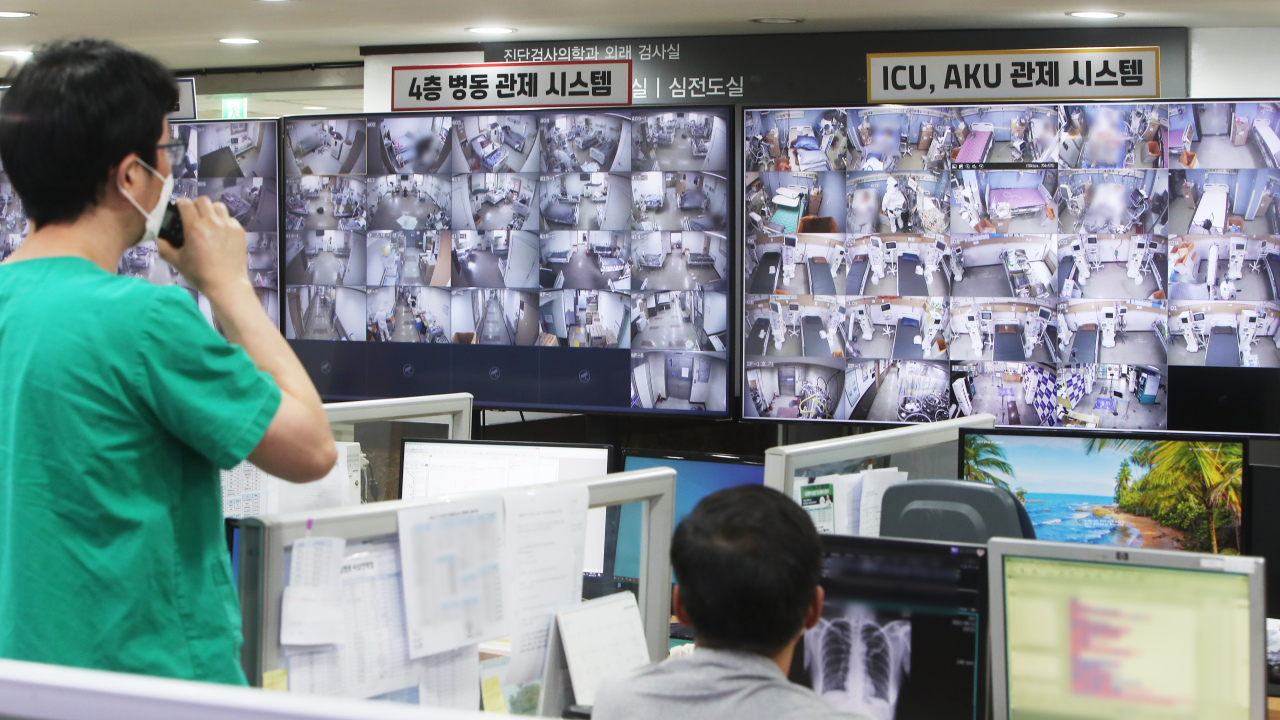 |
This photo taken on Thursday, shows medical staff monitoring patients at Bagae Hospital in Pyeongtaek, 70 kilometers south of Seoul, amid the spreading COVID-19 pandemic. (Yonhap) |
South Korea's daily new coronavirus cases remained in the 2,000s for the second straight day Friday amid little signs of letup, triggering the extension of the toughest level of virus restrictions for two more weeks.
The country added 2,052 more COVID-19 cases, including 2,001 local infections, raising the total caseload to 232,859, according to the Korea Disease Control and Prevention Agency (KDCA).
The daily caseload reached 2,152 the previous day, the second-largest number recorded since the COVID-19 outbreak in January last year after posting a record high of 2,222 on Aug. 11.
Daily cases exceeded 1,000 for the first time on July 7 and have stayed above 1,000 for 45 days in a row.
The country added six more deaths from COVID-19, raising the death toll to 2,197. The fatality rate was 0.94 percent.
While the current social distancing measures were set to expire Sunday, authorities decided to maintain the curbs until Sept. 5 as the fourth wave of the pandemic has yet to come under control.
The greater Seoul area, encompassing the capital, Gyeonggi Province and the western port city of Incheon, will be under the Level 4 social distancing rules, while most other regions will be subject to Level 3.
Restaurants and cafes in regions under Level 4 distancing rules will be required to close at 9 p.m., an hour earlier than the current 10 p.m. curfew starting Monday.
Since early July, South Korea has been grappling with the current wave of the pandemic amid the fast spread of the more transmissible delta variant and slow vaccinations.
The greater Seoul area, the epicenter of the latest wave of the outbreak and home to half of the country's 52 million people, has been under the Level 4 rules, the highest in the country's four-tier system, since July.
The southern resort island of Jeju and some other regions have also been under the toughest virus restrictions.
On top of slow vaccinations, a delay in the vaccine supply by US drugmaker Moderna Inc. has also prompted the decision to extend the current virus curbs.
Moderna recently notified the government it will supply less than half of the 8.5 million doses of its COVID-19 vaccine planned for August.
The supply setbacks have raised doubts over the government's plan to administer at least the first shot to 70 percent of the population, or 36 million people, by September and to achieve herd immunity in November.
As of Friday, 24.81 million people, or 48.3 percent of the population, had received their first shots of COVID-19 vaccines, the KDCA said.
The number of fully vaccinated people stood at 11.10 million, or 21.6 percent.
Of the locally transmitted cases, Seoul reported 549 new cases, and Gyeonggi Province, which surrounds the capital city, identified 633 new patients. The southeastern port city of Busan reported 131 more cases, and Incheon, 40 km west of Seoul, added 117 cases.
The number of new imported cases came to 51, raising the total to 13,045.
The number of patients with serious symptoms across the country reached 385, down from 390 a day earlier, the KDCA said.
The total number of people released from quarantine after making full recoveries was 202,775, up 1,540 from a day earlier. (Yonhap)








